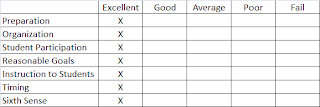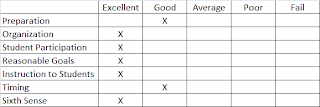 Warm-Up Listening Activity:
Warm-Up Listening Activity: List of Irregular Past Tense Verbs:
List of Irregular Past Tense Verbs:
 Short Story Activity:
Short Story Activity: Irregular Past Tense Verb Worksheet:
Irregular Past Tense Verb Worksheet:

Students review their passages during the Short Story Exercise.

Students explain their passages in new groups and piece together the story.
Overall, a varied and effective class. The following provides summary and minor recommended adjustments:
Warm-up Listening Activity: The conversation was presented in relatively natural cadence, so it took four or five times for students to understand main ideas. Before beginning, we reviewed new vocabulary words such as
laundry,
apartment,
picnic, and
instead. In hindsight, I would reconsider word choice in the following phrases:
last weekend and
this past weekend,
stay around town vs.
stay home,
couldn't stand to vs.
didn't want to. Overall, this warm-up activity served as a nice change of pace and seemed to engage students more than physically active, timeworn games.
Grammar and Pronunciation Lessons: The three grammar rules were review for students, though they seldom use the past tense in conversation. Next week, we will go over doubling the consonant for words ending in one vowel + one consonant, other than
w or
y.
For pronunciation of reduced forms of
did you, I supplemented the phonetic alphabet in the book with
didjew (
did you) and
whudjew (
what did you) on the board. Students thought my exaggerated presentation was funny, which created a comfortable environment for them to practice on their own.
Exercises in the Book: After completing the conversations, students read them aloud in pairs and as a class. This offered a chance to practice and critique the pronunciation of reduced forms of
did you. In the future, I will supplement oral exercise reviews with a powerpoint slide, so students have visual confirmation of the correct answers.
Magazine Activity: Always great for generating new vocabulary words. The blackboard was chock full by the time we were through.
 Short Story Activity:
Short Story Activity: A starkly different fit for each of the classes-- extremely challenging but doable for the Monday class, perfectly challenging with almost magical execution by the Tuesday class, and varying levels of challenging, though we ran out of time, for the Wednesday class. The activity was magical in the Tuesday class because very few students resorted to Vietnamese, they independently encouraged each other, and they acted and used gestures when their words failed. For the first time, I didn't feel the need to motivate them. I felt their strength and hunger as they took off on their own.
Lastly, a self-evaluation...
 * The list of irregular past tense verbs if from http://www.grammar.cl/Past/Irregular_Verbs_List.htm. The short story is from http://www.rong-chang.com/eslread/index.htm. The Irregular Verb Worksheet is from http://bogglesworldesl.com/irregular_verbs.htm.
* The list of irregular past tense verbs if from http://www.grammar.cl/Past/Irregular_Verbs_List.htm. The short story is from http://www.rong-chang.com/eslread/index.htm. The Irregular Verb Worksheet is from http://bogglesworldesl.com/irregular_verbs.htm.
 Map Activity: Print two copies of the map for each student.
Map Activity: Print two copies of the map for each student. 


 Warm-Up Listening Activity:
Warm-Up Listening Activity: List of Irregular Past Tense Verbs:
List of Irregular Past Tense Verbs:
 Short Story Activity:
Short Story Activity: Irregular Past Tense Verb Worksheet:
Irregular Past Tense Verb Worksheet:
 Students review their passages during the Short Story Exercise.
Students review their passages during the Short Story Exercise. Students explain their passages in new groups and piece together the story.
Students explain their passages in new groups and piece together the story.







 Preposition Worksheet:
Preposition Worksheet:



 Family Activity Powerpoint Slides:
Family Activity Powerpoint Slides:



 Pre-Listening Activity: Cut the paper in two halves, descriptions and pictures. Break students into pairs and have them take turns reading descriptions and searching for their matches.
Pre-Listening Activity: Cut the paper in two halves, descriptions and pictures. Break students into pairs and have them take turns reading descriptions and searching for their matches.

 Powerpoints from the Lesson:
Powerpoints from the Lesson:




 Alas, this lesson was too long ago to remember subtle observations. Students did, however, appreciate the jazz chant; and the opinion poll was a useful tool for practicing questions, sharing personal information, and breaking with routine.
Alas, this lesson was too long ago to remember subtle observations. Students did, however, appreciate the jazz chant; and the opinion poll was a useful tool for practicing questions, sharing personal information, and breaking with routine.